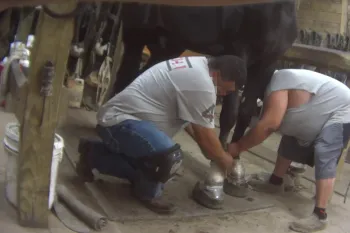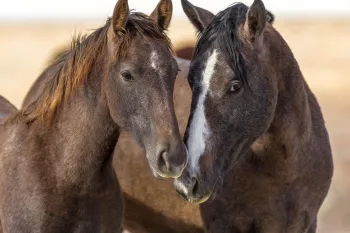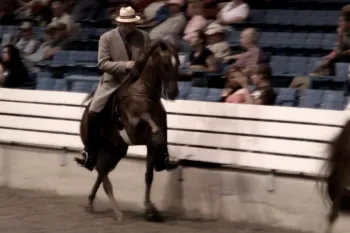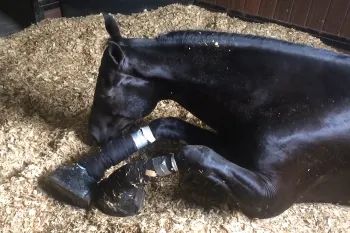In a blow to horses, the Trump administration has postponed implementation of a long-overdue federal rule to combat horse soring—–the deliberate infliction of pain on horses' legs and hooves to force an exaggerated gait—delaying enforcement until February 2026 and opening the door to even further setbacks.
Unfortunately, history is repeating itself here. The first Trump administration illegally withdrew a similar regulation in 2017, despite overwhelming public support for a rule that would help protect horses from this abuse. When President Trump issued a blanket executive order in January allowing agencies to delay implementation of pending rules, it is unclear whether he knew the Horse Protection Act rule was included. But the Walking Horse lobby certainly did. Now, the U.S. Department of Agriculture has postponed the rule until February 1, 2026, dragging its feet and opening the door to further delays.
We urge the Trump administration to take immediate steps to implement these reforms. The approach this rule takes has been carefully honed for more than a decade, and there is no reason to delay it further.
Since 1970, the federal government has promised to protect horses from soring in response to pleas from the public and the broader horse industry, which has consistently distanced itself from this cruel practice. It is being perpetrated by an outlier faction—a small segment of the Tennessee Walking Horse industry that continues to use outrageous means to force horses to perform the artificial high-stepping gait known as the "Big Lick."
Picture horses with caustic chemicals burning their flesh, and hooves cut to the quick, with hard objects jammed into their tender soles, forcibly trained to avoid flinching in pain when inspectors touch their feet and legs. The horses are outfitted with chains and heavy stacked shoes, paraded around with their legs flailing in the air—all while organ music accompanies a pageantry of flowers, sequins and tuxedos. It’s a spectacle, alright—a deeply cruel one.
And soring isn’t just perpetuated by isolated “bad apples.” The problem involves a corrupt, rigged subculture that shields trainers who engage in soring and refuses to either hold them accountable or support the USDA’s efforts to reform the industry. Indeed, leadership in the Walking Horse world often seems more closely aligned with a willingness to violate the rules rather than follow them. Our 2022 undercover investigation captured the president of the Walking Horse Trainers Association—who had been elected after being suspended by the USDA— witnessing soring at the barn of one of the breed’s most decorated trainers and later holding the reins while a stable worker sored a horse in the inspection station of a major show.
The small “Big Lick” faction of the Walking Horse industry has long refused accountability, choosing instead to operate in a manner that protects and even rewards sorers. The enforcement scheme in place has involved minimal USDA oversight, with inspections conducted primarily by industry-run Horse Industry Organizations—groups rife with conflicts of interest.
Maddeningly, a handful of (primarily Kentucky and Tennessee) legislators doing the bidding of the Big Lick faction have fought for decades to block reform. But they are out of step with the public and with Congress overall. The Prevent All Soring Tactics (PAST) Act—championed by a broad coalition of hundreds of horse industry, veterinary, law enforcement and animal protection groups—passed the House twice by overwhelming bipartisan margins and has consistently been co-sponsored by a majority in both chambers.
In addition, well over 100 representatives and almost half the Senate have repeatedly signed letters to USDA seeking reforms to end the failed system of industry self-policing and use of devices integral to soring. Appropriations provisions enacted each of the last four years pressed the agency to finalize regulations to make these needed reforms.
The horse sorers have had plenty of notice. A 2010 USDA Inspector General report called for an end to self-policing for this problematic sector, a reform that USDA agreed to pursue then. A 2021 report by the National Academies of Sciences, Engineering and Medicine also concluded that self-policing in this sector is a failure and should be discontinued. In 2024, the USDA finalized a rule to replace industry-run inspections with USDA-trained Horse Protection Inspectors and ban use of soring devices and substances.
Once again, the “Big Lick” faction scrambled to forestall reforms.
While a Texas federal district court ruling—driven by an industry lawsuit against the USDA—struck down parts of the 2024 rule, its essential provision remains intact: the elimination of industry self-policing and the shift to federally-trained inspectors.
There is no question that horses are still being sored and rulemaking is needed. The USDA’s own data show that industry inspectors find only a fraction of the violations that USDA-trained inspectors do, and undercover investigations continue to show the same patterns of abuse and violations. Implementing the rule quickly will allow the USDA to actually get the job done rather than waste tax dollars trying to babysit the corrupt self-policing entities.
The sorers won’t succeed at evading accountability if we have anything to say about it. Soring is patently, obviously cruel, and we won’t stop fighting until not a single horse suffers this cruelty.
We need your help to let this administration know that further delay on this rule is unacceptable. Please urge the USDA to protect horses now.
Sara Amundson is president of Humane World Action Fund.




